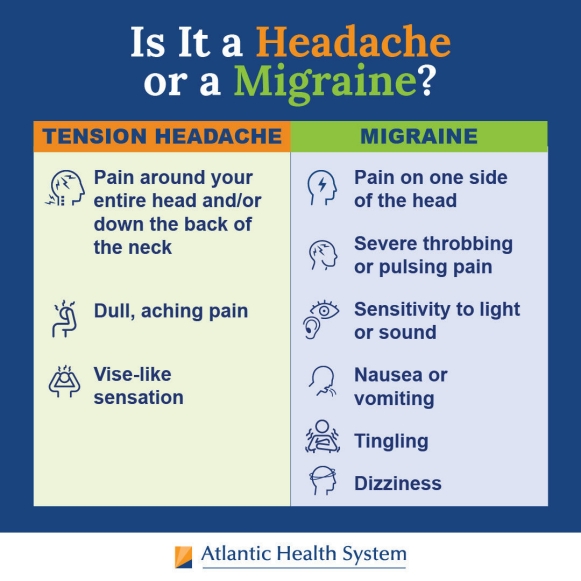
An estimated 39 million Americans live with migraines, but the condition is often underdiagnosed and undertreated. Understanding the difference between a migraine and a headache can be the key to finding long-lasting relief. Seth Stoller, MD, a neurologist with Atlantic Health System, discusses the difference between migraines and headaches, what the symptoms are and how to treat them.
Migraines
Even though migraines are a type of headache, it’s more than just a painful, throbbing sensation in your head. Believed to be caused by the circuitry of your brain, Dr. Stoller explains that migraines must meet specific criteria to be diagnosed. That includes neurological sensations such as flashing lights, known as aura, that occasionally precede migraine pain.
Migraine symptoms
Women are more likely to have migraines than men, and many people have a family history of the condition. Most people who experience migraines will have several of the following symptoms:
- Severe throbbing or pulsing pain on one side of the head
- Sensitivity to light or sound
- Nausea or vomiting
- Tingling
- Dizziness
Migraine triggers
Many migraine triggers such as chocolate, cheese, MSG, alcohol, smoke, nitrates and nitrites (commonly found in preserved meats), changes in sleep habits or skipping meals, can be controlled. Others, including hormone fluctuations and shifts in barometric pressure, are impossible to change. Dr. Stoller asks his new patients to keep a diary of what triggers their migraines, as well as their timing and how long they last.
Migraine treatments
While some people manage their migraines by eliminating triggers and using over-the-counter pain relievers, Dr. Stoller says prescription migraine treatment options are likely to provide better relief. Daily preventive medications are highly effective and so-called “rescue” prescriptions are also available to stop a migraine once it has begun.
“Migraines have become a very treatable condition and we have many therapeutic options in our arsenal,” says Dr. Stoller. “It might take some trial and error to find the right combination of therapies, but the majority of patients find long-lasting relief from their migraine symptoms.”
Tension headaches
While some headaches can be extremely painful, the absence of light and sound sensitivity, nausea or vomiting separates them from migraines. The most common type of non-migraine headache is tension headache, which is the result of a muscular contraction of your scalp.
Tension headache symptoms
Symptoms of a tension headache include:
- Pain around your entire head
- Vice-like sensation
- Dull, aching pain
- Pain down the back of your neck
Tension headache triggers
Tension headaches affect men and women equally. Stress, anxiety and poor posture are the most common causes of tension headaches, as well as sitting while at a desk, driving a car or looking down at a tablet or phone. Low blood sugar and dehydration are also common culprits.
Tension headache treatments
Most headaches can be controlled with lifestyle modifications and over-the-counter medications including naproxen sodium and ibuprofen. Dr. Stoller adds that people with frequent tension headaches might benefit from stress-reducing activities including yoga, meditation and walking.
If you struggle with daily headaches or several headaches each week, Dr. Stoller recommends visiting your primary care doctor or a neurologist.
“Medication overuse headaches are a common issue. A better method is to determine the root cause of your headaches and work to eliminate or reduce that trigger,” he says. “You don’t need to have migraines to seek help.”
With the help of your primary care doctor or a neurologist, you can prevent migraines and headaches from taking over your life. “We don’t want anyone to lose time with their family or to miss work or school because of migraine or headache pain,” says Dr. Stoller. “There is no need to suffer in silence and we’re here to help.”
Be Proactive About Your Health
To stay safe and healthy, it's good to have a primary care provider who knows and understands your health history and wellness goals.
